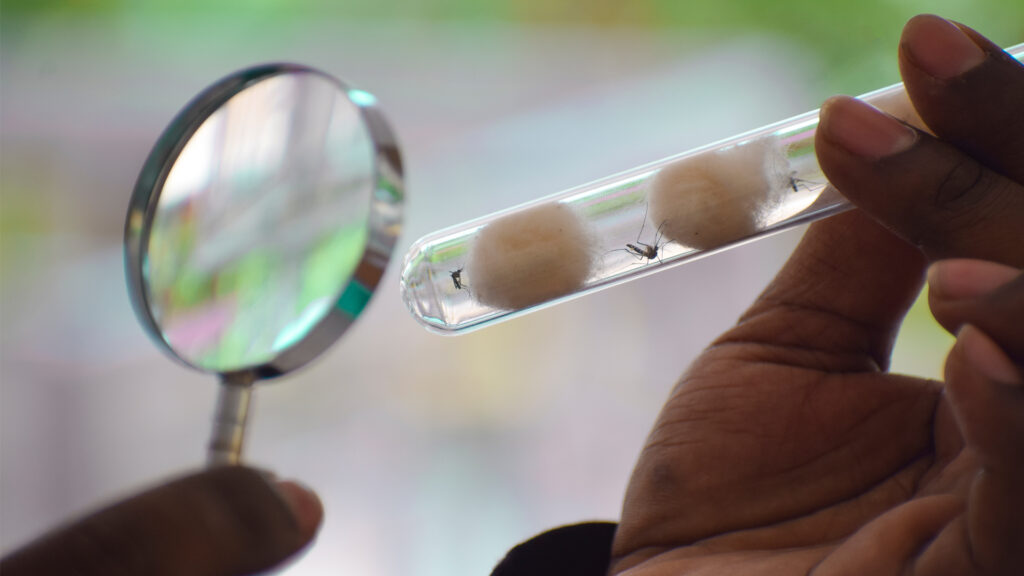By Sadie Ryan, Florida Climate Institute
As a medical geographer who studies emerging pathogens and lives in Florida, I’ve noticed an interesting pattern throughout the past several months: more calls from journalists. Often, they will tell me they googled “climate change,” “mosquitoes” and “Florida,” and voila, my name pops up. And they usually ask a similar question: Am I more concerned about malaria today because of climate change?
As someone whose job involves vector-borne disease modeling, it is concerning to say yes. But I must admit, I am. I worry because outside Florida, changing rainfall patterns and warmer temperatures are giving mosquitoes new places to thrive across the globe. I worry about the unnerving rise of the Anopheles stephensi mosquito species, a relatively new species that now thrives in urban environments. And I worry because of how interconnected our world is, and how much more commonplace it has become to travel internationally — and to bring malaria back home.

In fact, that is how I was exposed to malaria nearly two decades ago. As a postdoc student, I was in Ghana studying baboons. I could feel myself getting bitten by mosquitoes, but I also knew I wasn’t going to be there more than a few weeks. When I returned home, I ended up in the hospital. I knew I had malaria, but my fever was so severe that I was slipping in and out of consciousness. It took my medical team days to figure out it was malaria making me sick, but thankfully, I made a full recovery.
Fast forward to today, and malaria is, again, top of mind for many of us. The Centers for Disease Control and Prevention issued its first U.S. malaria warning in 20 years last summer after cases of locally acquired, mosquito-transmitted malaria cropped up not only in Florida, but Texas, Arkansas and Maryland.
Months later, the World Health Organization reported that the global tally of malaria cases reached 249 million in 2022 — well above the estimated number of cases before the COVID-19 pandemic, and an increase of five million over 2021. And looking to the future, it’s alarming that the Intergovernmental Panel on Climate Change now estimates 51 to 62 million people will be at risk of malaria in eastern and southern Africa by the 2030s because of global warming.
So yes, I’m concerned, but I have a confidence in science and technology. Here in Florida, we are accustomed to mosquito control. Last summer, a helicopter sprayed thousands of acres ahead of July Fourth. And globally, even with half the world’s population at risk of malaria, the U.S. President’s Malaria Initiative and the Global Fund to Fight AIDS, Tuberculosis and Malaria are great examples of what effective investment in malaria control can do, having averted nearly 12 million deaths since 2000.
Plus, we now have two malaria vaccines being rolled out across parts of Sub-Saharan Africa. And with increased investment, many more exciting tools and technologies are now in the pipeline that are expected to be gamechangers in the fight to end malaria.
While the world has made significant strides to combat malaria, climate change threatens to hinder that progress. Not all U.S. states are as prepared as Florida to effectively handle an increase in mosquitoes. And across the U.S., we still lack unified systems to harmonize and streamline data on vector-borne cases, particularly as climate change shifts mosquito breeding patterns. We also saw record-breaking heat across the world last year and could again this year, meaning that as the climate warms, in new places, mosquitoes emerge earlier and survive longer.

Seeing the same life-threatening disease that nearly killed me back in the headlines two decades later is troubling, but there are many more things we can do and have been doing successfully to effectively protect people. From new tools and technologies to ward off malaria, to efforts to climate-proof health systems, greats strides are being made to eradicate humanity’s oldest and deadliest disease.
With only a handful of cases last year, I am not ready to sound the alarm on malaria here in the United States just yet. But I do worry the past two decades of progress in the malaria fight risk sharp reversal around the world because of climate change — meaning it’s high time we prepare before it’s too late.
Sadie Ryan is co-director of the Florida Climate Institute at the University of Florida. This opinion piece was originally published by the Orlando Sentinel, which is a media partner of The Invading Sea.
If you are interested in submitting an opinion piece to The Invading Sea, email Editor Nathan Crabbe at ncrabbe@fau.edu. Sign up for The Invading Sea newsletter by visiting here.



